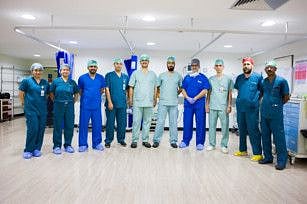Abu Dhabi: An Abu Dhabi patient underwent a successful minimally-invasive procedure to address his debilitating facial pain.
Ibrahim had been suffering from acute pain on the left side of his face, that felt like sharp needle punctures. The pain would occur even with mild stimulation of the face — including simple, daily activities such as brushing teeth, eating, drinking or even talking.
Diagnosis
Ibrahim visited Tawam Hospital, an Abu Dhabi Health Services Company (Seha) facility in Al Ain. The hospital said in a statement that Ibrahim was diagnosed with trigeminal neuralgia — a chronic pain that affects the trigeminal nerve, which carries the sensation from the face to the brain.
Dr Ali Hassan, consultant neurologist, diagnosed Ibrahim and prescribed sedative drugs to ease the nerve inflammation. “Trigeminal nerve inflammation is usually caused by congenital deformities that result at the point of contact between a blood vessel and the trigeminal nerve, in the area where the nerve exits the brainstem. This leads to constant irritation in the nerve and continuous neurotransmission. The brain deals with this by creating very severe pain in the facial nerve,” explained Dr Mohammed Al-Asha, consultant neurosurgeon at the hospital and lead surgeon handling Ibrahim’s treatment.
Surgical procedure
“The challenge was that the MRI scans showed no deformity or neuro-arterial conflict. However, after exploring Ibrahim’s case very carefully and adopting a multidisciplinary approach of consultation, we collectively decided to go for a surgical procedure to free the trigeminal nerve from any pressure caused by the attached blood vessels,” the doctor added.
The procedure was completed using minimally-invasive, neurosurgical and physiological monitoring devices. The surgery was a success, with the identification of a severe adhesion between the trigeminal nerve and a blood vessel.
The patient was discharged after two days and he was able to return to daily activities without any further pain.
Sign up for the Daily Briefing
Get the latest news and updates straight to your inbox
Network Links
GN StoreDownload our app
© Al Nisr Publishing LLC 2026. All rights reserved.
